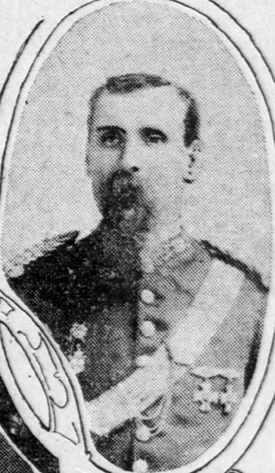25 June 1837–17 Feb. 1905
See also: Kirk-Holden War

George W. Kirk, Union army officer in the mountains and leader of the state militia against the Ku Klux Klan, was born and raised in Greene County, Tenn. He received a liberal education, and in 1860 married Marie L. Jones.
Early in the Civil War, Kirk may have joined or been conscripted into the Confederate Army. His sentiments were outspokenly Unionist, however, and by 1862 he left the state to join the Federal army. He received several promotions, emerging from the war as a colonel. In 1864 and 1865, after raising a cavalry regiment among the mountain Unionists of North Carolina and Tennessee, he developed a reputation as leader of a series of daring and destructive raids into western North Carolina. In June and July 1864 he took 130 men from Morristown, Tenn., to Camp Vance, near Morganton, captured its garrison, and destroyed considerable military and railroad equipment before slipping back through the mountains. He led later forays into Caldwell, McDowell, Haywood, Watauga, and Macon counties before hostilities ended in May 1865. In many of these operations Kirk and his men lived off the land, seizing and destroying the property of Confederate supporters and thereby winning their undying enmity.
After the war, in 1866, Kirk settled briefly in Asheville and in Rutherfordton, where he opened a small store. But he soon returned to Tennessee and engaged principally in farming in Washington County. In 1867 he was commissioned in the Tennessee militia, and two years later commanded a regiment that occupied Jackson and Overton counties and arrested several Ku Klux Klansmen.
In June 1870, while visiting Washington, D.C., as a war claims agent, he was commissioned by Governor W. W. Holden to raise a regiment of North Carolina militia in the mountains for the purpose of quelling Ku Klux terrorism in Alamance and Caswell counties. He enlisted over 600 men, some of them wartime comrades-in-arms and perhaps a third of them fellow Tennesseans. In July he took 200 of the recruits to Alamance and Caswell, where they proceeded to arrest about 100 men charged with murder and other serious crimes. Opponents charged the militia with atrocities, but with a few exceptions not under his immediate surveillance, Kirk's prisoners testified to fair treatment. Although the so-called Kirk-Holden war succeeded in breaking up Klan organization and activity in the two counties, the prisoners were never punished owing to the collusion of local officials and the governor's inability to try them by special tribunal. Moreover the campaign triggered an adverse political reaction, helping Democrats to win the August legislative elections and providing grounds for their later impeachment of Governor Holden.
Kirk was immediately subjected to legal retaliation by his recent prisoners. When the militiamen were disbursed in September, he went to Raleigh under an arranged Federal arrest in order to evade sheriffs and process servers. In December, cleared of Federal charges and threatened with mob violence, he returned secretly and by a circuitous route to his home in Tennessee.
Not long afterwards Kirk moved to Washington, D.C., and served as an officer of the police force guarding the government buildings. For several years he was employed in the Patent Office. He then returned to the mountains, took up mining, and reportedly made and lost several fortunes. In 1898, suffering from heart and kidney ailments, he went to California where he moved about, chiefly in the mining districts. By 1900 he was living in Oakland. He died at Gilroy, Calif., survived by his wife and two sons, John A., an architect and highway construction official at Gilroy, and W. T. S., a mining engineer in Alameda.